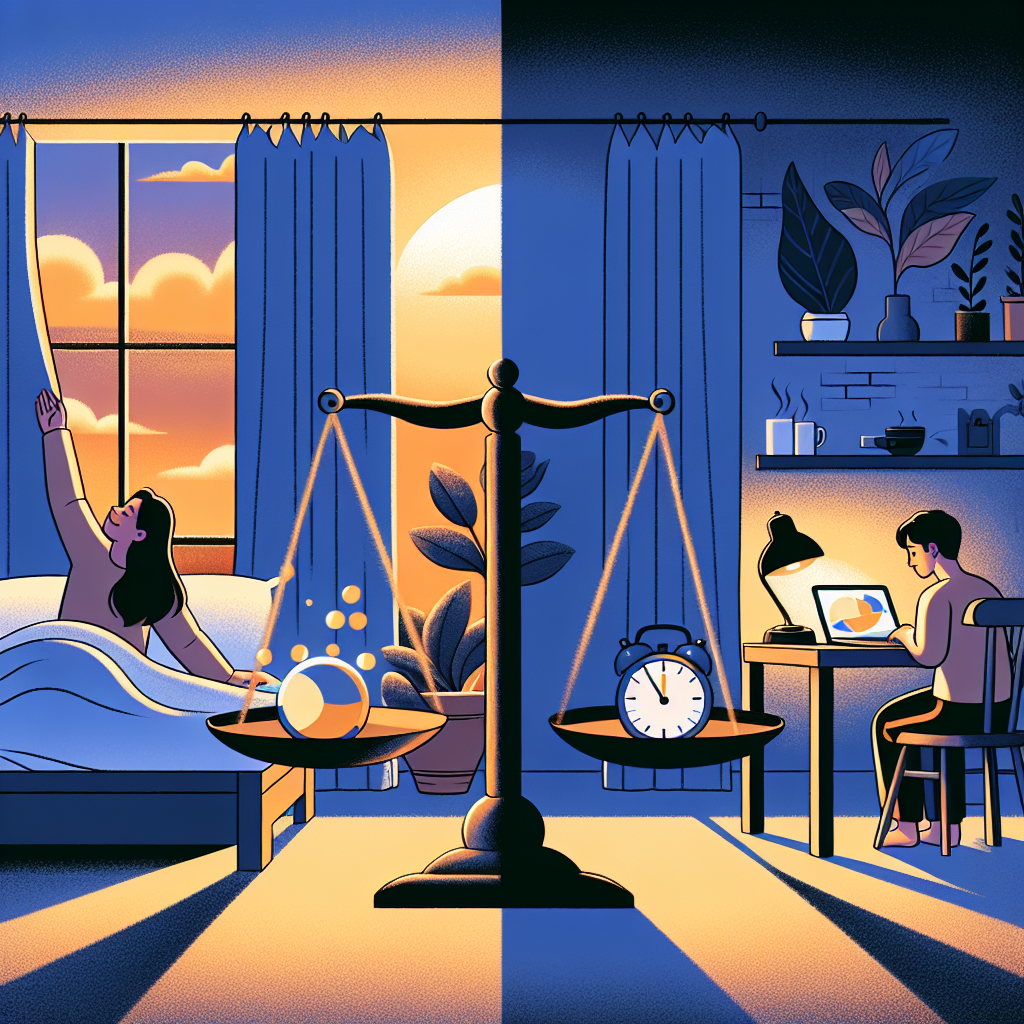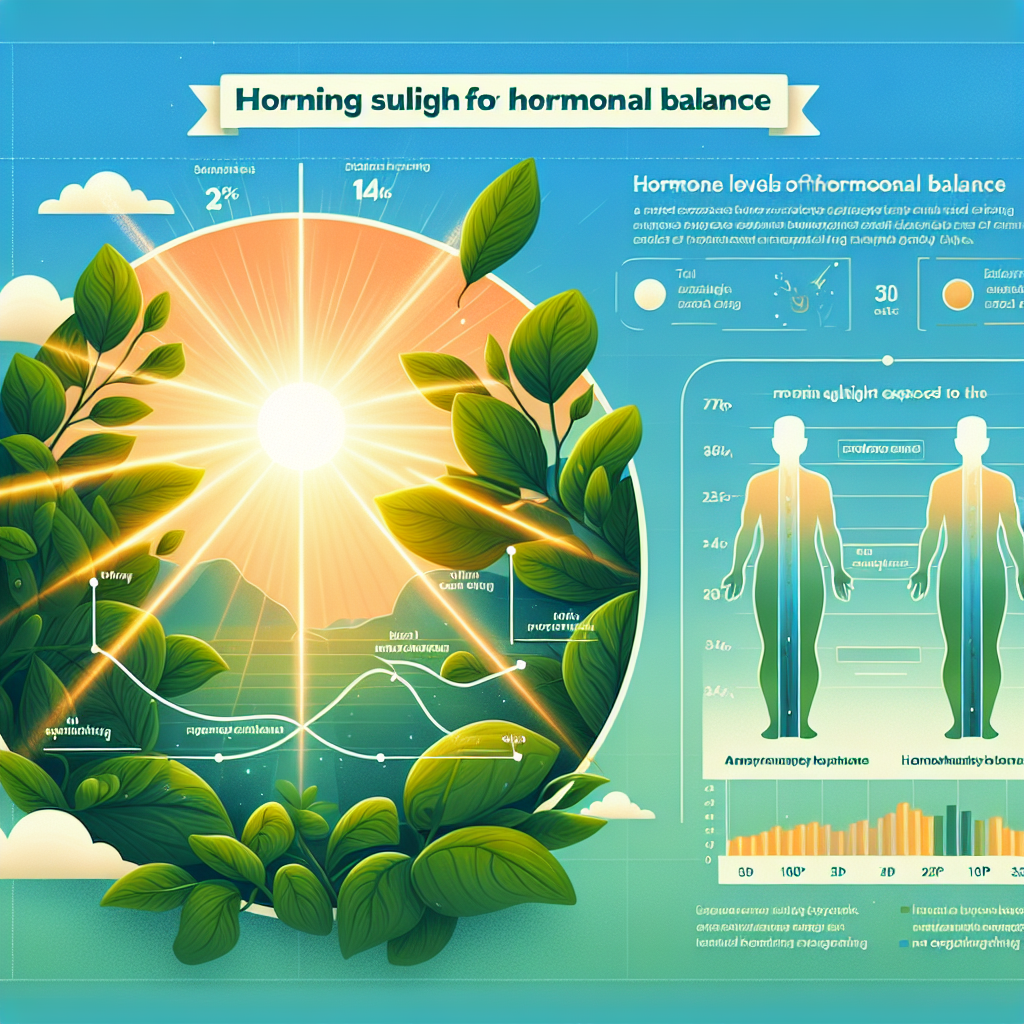Why Morning Sunlight Is Crucial for Hormonal Balance

Discover why morning sunlight is crucial for hormonal balance. Learn more about its importance and how you can incorporate it into your daily routine for a healthier lifestyle. Visit My Vibrant Vitality today.
Exploring the Connection Between Morning Sunlight and Hormonal Balance
The importance of sunlight for our overall health is a well-established fact. However, the specific role of morning sunlight in maintaining hormonal balance is a topic that deserves more attention. This article aims to explore the connection between morning sunlight and hormonal balance, shedding light on why this natural resource is crucial for our well-being.
Sunlight, particularly morning sunlight, plays a pivotal role in regulating our body’s internal clock, also known as the circadian rhythm. This rhythm is responsible for controlling various physiological processes, including hormone production and release. The exposure to morning sunlight helps to reset our circadian rhythm, ensuring that our body’s hormonal processes are synchronized with the day-night cycle.
One of the key hormones influenced by morning sunlight is melatonin, often referred to as the ‘sleep hormone’. Melatonin production is suppressed by light and stimulated by darkness. By exposing ourselves to morning sunlight, we signal our bodies to halt melatonin production, promoting alertness and wakefulness during the day. Conversely, as darkness falls, melatonin production ramps up, preparing us for sleep. This cycle is crucial for maintaining a healthy sleep-wake pattern, which in turn influences other hormonal processes in the body.
Another hormone significantly affected by morning sunlight is cortisol, the ‘stress hormone’. Cortisol levels naturally peak in the early morning hours to help us wake up and prepare for the day. Exposure to morning sunlight helps to regulate this peak, ensuring that cortisol levels decrease throughout the day. This regulation is essential as prolonged high levels of cortisol can lead to various health issues, including anxiety, depression, and even certain chronic diseases.
Morning sunlight also plays a role in the production of serotonin, the ‘feel-good hormone’. Exposure to sunlight triggers the release of serotonin, which is associated with boosting mood and helping a person feel calm and focused. Low levels of serotonin are linked to a higher risk of depression. Therefore, regular exposure to morning sunlight can serve as a natural mood enhancer.
Vitamin D synthesis is another crucial process influenced by morning sunlight. When our skin is exposed to sunlight, it produces Vitamin D, a hormone that plays a vital role in bone health, immune function, and inflammation reduction. Many people worldwide are deficient in Vitamin D, primarily due to inadequate sun exposure, leading to various health problems, including osteoporosis and certain types of cancer.
In conclusion, the importance of morning sunlight for hormonal balance cannot be overstated. It plays a crucial role in regulating our body’s internal clock, influencing the production and release of several key hormones, including melatonin, cortisol, serotonin, and Vitamin D. By ensuring regular exposure to morning sunlight, we can help maintain our hormonal balance, promoting overall health and well-being. However, it’s important to remember that while sunlight is beneficial, excessive exposure can lead to skin damage. Therefore, it’s essential to balance the benefits of sunlight with the need for skin protection.
The Role of Morning Sunlight in Regulating Hormones

The role of morning sunlight in regulating hormones is a topic that has been gaining increasing attention in the scientific community. It is now understood that exposure to morning sunlight can have a profound impact on our hormonal balance, influencing our mood, energy levels, sleep patterns, and overall health.
The human body operates on a 24-hour cycle known as the circadian rhythm. This internal clock, which is influenced by environmental cues such as light and darkness, regulates various physiological processes, including hormone production. When this rhythm is disrupted, it can lead to hormonal imbalances and associated health problems.
One of the key hormones influenced by sunlight is melatonin, often referred to as the ‘sleep hormone’. Melatonin is produced by the pineal gland in the brain and its production is heavily influenced by light exposure. As darkness falls, the pineal gland is triggered to produce more melatonin, preparing the body for sleep. Conversely, as morning light filters through, melatonin production decreases, signaling to the body that it’s time to wake up and start the day. Regular exposure to morning sunlight can therefore help regulate sleep patterns and ensure a healthy balance of melatonin.
Another hormone that is regulated by sunlight is serotonin, also known as the ‘feel-good hormone’. Serotonin plays a crucial role in mood regulation, and low levels of this hormone have been linked to depression. Exposure to sunlight, particularly in the morning, has been shown to increase serotonin levels, thereby boosting mood and promoting a sense of well-being.
Cortisol, the body’s main stress hormone, is also influenced by sunlight. Normally, cortisol levels peak in the early morning, providing a burst of energy to start the day, and gradually decrease throughout the day. However, lack of exposure to morning sunlight can disrupt this pattern, leading to imbalances that can contribute to stress, fatigue, and other health issues.
Vitamin D, although not a hormone, is another crucial substance that is synthesized in the skin in response to sunlight. Known as the ‘sunshine vitamin’, vitamin D plays a vital role in bone health, immune function, and hormone regulation. Deficiency in this vitamin has been linked to a host of health problems, including hormonal imbalances.
In conclusion, the role of morning sunlight in regulating hormones is significant. By setting our internal clock, it helps maintain a healthy balance of hormones such as melatonin, serotonin, and cortisol, and promotes the synthesis of vitamin D. Therefore, incorporating regular exposure to morning sunlight into our daily routine can be a simple and effective way to support hormonal balance and overall health. However, it’s important to remember that excessive sun exposure can have harmful effects, including skin damage and increased risk of skin cancer. Therefore, it’s recommended to balance sun exposure with sun protection measures, such as wearing sunscreen and protective clothing.
In our modern, indoor-centric lifestyles, it can be easy to overlook the importance of natural sunlight. However, as research continues to uncover the profound impact of sunlight on our hormonal health, it becomes clear that stepping outside to greet the morning sun is more than just a pleasant way to start the day – it’s a crucial step towards hormonal balance and overall well-being.
Understanding the Importance of Morning Sunlight for Hormonal Health
The importance of morning sunlight for hormonal health is a topic that has been gaining significant attention in recent years. As we delve into the intricacies of our body’s internal clock, or circadian rhythm, we begin to understand the profound impact that natural light, particularly morning sunlight, has on our hormonal balance.
Our bodies are designed to respond to the natural cycle of day and night. This response is regulated by our circadian rhythm, which is essentially our internal 24-hour clock that governs various physiological processes. One of the key regulators of our circadian rhythm is light, specifically the blue light that is abundant in morning sunlight.
Exposure to morning sunlight helps to reset our circadian rhythm each day. This is crucial because our circadian rhythm influences the production and release of various hormones, including cortisol, melatonin, and serotonin. These hormones play a significant role in regulating our mood, energy levels, sleep patterns, and overall health.
Cortisol, often referred to as the ‘stress hormone’, is one of the hormones that is directly influenced by morning sunlight. Upon waking, cortisol levels are naturally at their highest to help us feel alert and energized for the day ahead. Exposure to morning sunlight helps to stimulate the production of cortisol, ensuring that its levels are optimal for the day.
On the other hand, melatonin, the ‘sleep hormone’, is suppressed by morning sunlight. Melatonin levels naturally rise in the evening as the sun sets, preparing our bodies for sleep. By exposing ourselves to morning sunlight, we help to ensure that melatonin production is suppressed during the day, promoting alertness and helping to establish a healthy sleep-wake cycle.
Serotonin, the ‘feel-good hormone’, is another hormone that is positively influenced by morning sunlight. Exposure to sunlight has been shown to increase serotonin levels, which can boost mood and help ward off depression. This is particularly important during the winter months when sunlight is scarce, and people are more prone to seasonal affective disorder, a type of depression that is linked to changes in seasons.
In addition to regulating hormone production, morning sunlight also plays a role in vitamin D synthesis. Vitamin D, often referred to as the ‘sunshine vitamin’, is synthesized in the skin in response to sunlight. Adequate levels of vitamin D are essential for bone health, immune function, and hormonal balance.
Despite the clear benefits of morning sunlight, many of us do not get enough. This can be due to a variety of factors, including lifestyle habits and geographical location. However, even a few minutes of exposure to morning sunlight can have a positive impact on our hormonal health.
In conclusion, morning sunlight plays a crucial role in maintaining hormonal balance. It helps to regulate the production and release of key hormones, establish a healthy sleep-wake cycle, boost mood, and promote overall health. By making a conscious effort to expose ourselves to morning sunlight, we can support our hormonal health and enhance our wellbeing.